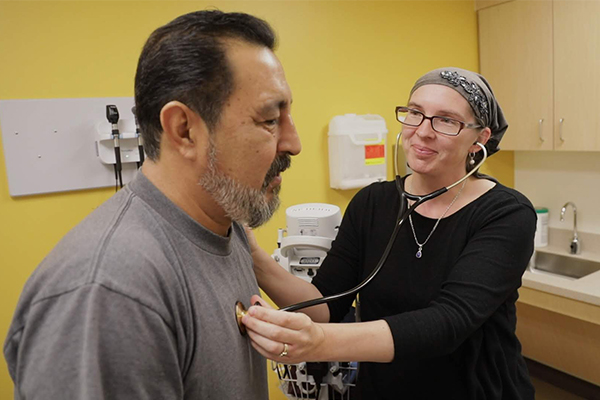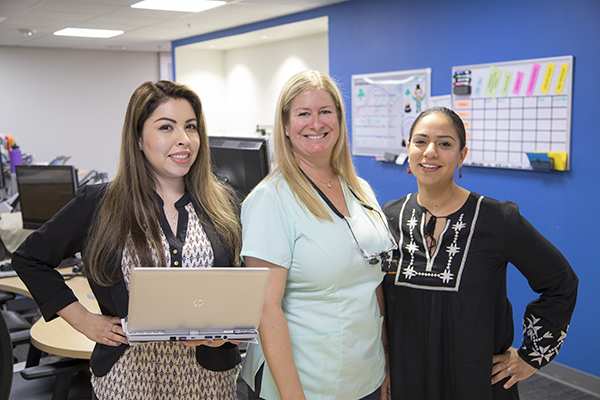August 28, 2023 | Clinics / In the News
Check out this AZ Republic article that includes our very own, Dr. Nancy Hagener, talking about the integrated behavioral health component we have here at Mountain Park. Expanding behavioral health by including this therapy program for pediatric patients is something we’re excited and proud of!
“Having trouble finding a therapist? A community health center might be able to help
Stephanie Innes Aug. 23, 2023 Arizona Republic
Arizonans feeling discouraged in a search for mental health care might want to try one of the state’s community health centers, which have expanded their services rapidly after a pandemic-fueled spike in demand. Federally qualified community health centers across Arizona accept most health insurance plans, offer care on a sliding fee scale, and don’t turn anyone away for an inability to pay. The centers, depending on the site, offer mental and behavioral health services, from depression screenings to therapy and psychiatry, including psychiatric medication management and medication-assisted treatment for people with substance-use disorders. Marana-based MHC Healthcare, which reports that its behavioral health patient numbers have jumped by 67% since 2020, just hired two psychiatrists and is looking to further expand its behavioral health program. Mountain Park Health Center, which has locations across metro Phoenix, is launching a pilot therapy program for adolescents this year, and El Rio Health in Tucson last year created a first-ever adolescent behavioral health program because of needs that emerged during the pandemic. When the pandemic hit Arizona in 2020, before the availability of the COVID-19 vaccine, communities of color and lower-income people were disproportionately affected by illness and death. People in those communities
were often front-line workers and living with multiple family members in one housing unit, which meant they were less able to isolate if exposed to the virus. Those hit hardest by COVID-19 often were getting their medical care at community health centers, which are located in medically underserved areas across the state. The centers quickly found themselves responding to a higher need for services related to grief and trauma, to behavior problems in kids, and to general anxiety and depression. “We’re going to be seeing the fallout of this (COVID-19) for decades, as far as mental health goes,” said Nancy Hagener, director of integrated behavioral health services at Mountain Park Health Center, which operates nine clinics in the Phoenix area. “We are not over the pandemic by any means. That’s why I feel it’s so important to grow our program here.” Community health centers often refer to their programs as “behavioral health.” According to center leaders as well as a federal government definition, that includes mental health care, as well as the promotion of resilience and well being; the treatment of mental and substance use disorders; and the support of those who experience or are in recovery from those conditions, along with their families and communities. Arizona health centers to start a psychiatric residency program Mountain Park Health Center has had an integrated behavioral health component of its primary care services since the early 2000s, but has in recent years been expanding its behavioral health workforce. Hagener said she’s hopeful that the therapy program for kids ages 12 to 17 at Mountain Park’s Baseline Clinic will be the first of more mental health expansion at Mountain Park.
“It’s been a long time coming. The pandemic definitely prompted us to say ‘OK, it’s time,'” Hagener said of the therapy program. “We’re starting with adolescents first, because the need is so high with them.” Marana-based MHC Healthcare’s active behavioral health patient number increased to more than 9,000 people from 5,400 before the pandemic, leaders said. During the summer of 2025, MHC expects to begin a psychiatric residency program for medical school graduates. El Rio Health’s behavioral health staff of more than 100 is about double the number it had at the beginning of the pandemic, said Vanessa Seaney, who is El Rio’s chief of behavioral health and integration. Patient mental health needs began to rise in April 2020, “and it has not stopped,” Seaney said. El Rio’s adolescent behavioral health program, which includes a child and adolescent psychiatrist, launched in June 2022, and almost everyone on the provider team from that program speaks Spanish, Seaney said. The program, which has seen about 700 youths since it began, doesn’t treat kids under the age of 12, though that’s a plan for the future, she said. El Rio also has a program for adults and adolescents known as MAT, or medication-assisted treatment for treating opioid use disorder, a problem that increased significantly during the pandemic, state and federal data show. Like MHC Healthcare, El Rio is expecting to start a psychiatric residency program for medical school graduates. El Rio leaders anticipate their residency program beginning in 2024. ‘We’ve been successful in recruiting staff, but do we need more? Yes.’ Demand for all kinds of mental health care, including psychiatric services, has risen since COVID-19. But the biggest rise has been in requests for therapy, El Rio’s Seaney said.
“The demand for therapy really significantly increased through the pandemic, and there can be a wait for that. We are doing everything we can to bring in more clinicians, offer telehealth services,” Seaney said. “We’ve been successful in recruiting staff, but do we need more? Yes.” At the Chiricahua Community Health Centers Inc. in rural Cochise County, behavioral health director Tamika Sullivan said the growth in mental health needs during COVID-19 was “massive.” The need has gone down somewhat, but it’s not back to pre-pandemic levels, she said. “A year or two ago, we had one of the counseling agencies (in Sierra Vista) close down that worked with children, so we had a big scramble to take in new kids from that agency,” Sullivan said. “That was a little difficult. … I wouldn’t say we’re overwhelmed now, but could I use more staff? Oh, yes.” The Chiricahua Community Health Centers employs three psychiatric nurse practitioners and a fourth, who will work in the border city of Douglas, is scheduled to begin in October. Chiricahua has had a job opening for a psychiatrist for about six to eight months. The lack of a psychiatrist means some patients who need a psychiatric evaluation with in-depth screening will have to go to Tucson or Phoenix, Sullivan said. “Psychiatry and neuropsychiatrists, there just are not a lot of them in general,” she said. Adelante Healthcare, which has nine locations in Maricopa County, has had a behavioral health component for years, but like many other federally qualified health centers in Arizona, significantly expanded those offerings over the past few years, said Susan Boyles, Adelante’s director of behavioral health. Adelante’s behavioral health staff has gone from six employees four years ago to the current 102. It has plans to add more providers and intake specialists in the next few months.
Like some other community health centers across Arizona, Adelante has long used a collaborative model of integrating employees who are called behavioral health consultants into regular medical visits, whether it’s primary care, pediatrics or dental. Adelante’s behavioral health program includes telehealth therapists and on-site therapists with dedicated caseloads, which means adults or children who get care there are able to stick with one therapist over time, Boyles said. Adelante also has case managers who work with providers to ensure patients’ other needs are being met as well, including physical health and factors such as food security, transportation and housing. Adelante also does psychiatric evaluations. If mental health care is needed that goes beyond Adelante’s capacity, Boyles said the center will refer elsewhere, “but offer assistance to patients for coordination of care.” ‘We in community health do this as part of our mission’ While most community health centers historically offered physical health care and later added mental and behavioral health services, Phoenix-based Valle del Sol community health center began with a mission of offering mental and behavioral health. It was founded more than 50 years ago by a group of community members who were concerned about local Latinos struggling with substance use disorders and other health disparities, president and CEO Mike Renaud said. It’s only in the past five years that Valle del Sol has begun offering more primary care services, he said. Valle del Sol has approximately 250 employees, 190 of whom are behavioral health staff, and it is hiring more, Renaud said. The population of people who sought and received behavioral health services at Valle del Sol increased by about 60% between 2020 and the end of 2022, Renaud said.
“We’re recruiting for all levels of behavioral health staff. It’s a challenge, and it gets particularly acute when you look at specialties. Child psychiatry is a very in-demand field, and those recruits can take many, many months. Addiction specialists are also very in demand,” Renaud said. Valle del Sol offers therapy, and the goal is for patients to remain with the same therapist, just as they would if they were to seek care from a private provider, he said. “We in community health do this as part of our mission. We are here because we want to make sure people get the help they need to be successful in life,” Renaud said. “We provide the same high level of care to anyone who walks through our doors. … We’ve got a lot of need to meet, but we are definitely committed to doing it.” Reach health care reporter Stephanie Innes at Stephanie.Innes@gannett.com or at 602-444-8369. Follow her on X, formerly Twitter: @stephanieinnes. “


